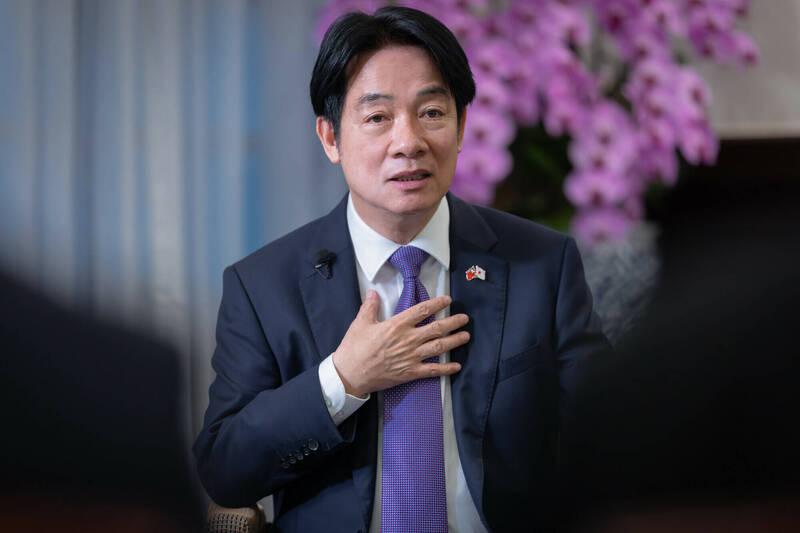President William Lai (賴清德) urged Japan to pursue a bilateral trade deal with Taiwan and support Taiwan’s accession to the Comprehensive and Progressive Agreement for Trans-Pacific Partnership (CPTPP) trade pact in an interview published in Nikkei Asia today.
As Lai approaches one year in office, he granted his first foreign media interview this year to the Japan-based publication.
Amid US President Donald Trump’s proposed tariffs and escalating Chinese military exercises around Taiwan, Lai said, “Japan is a powerful nation. I sincerely hope that Japan can take a leading role amid these changes in the international landscape.”

Photo: Taipei Times
Lai said that Taiwan plans to leverage its production and manufacturing capabilities to establish a “non-red” global semiconductor supply chain partnership for democratic countries such as Japan, the US and the Netherlands.
“Japan has materials, equipment and technology, the US has [integrated circuit] (IC) design and marketing, Taiwan has production and manufacturing, and the Netherlands excels in equipment,” he said.
“Over the past few decades, the free economy headed by the Western world and led by the United States has brought economic prosperity and political stability” to Taiwan, he said, adding that not all countries have been “exemplary students.”
Lai said that China is currently the “biggest crisis” to the free-trade system due to plagiarism, counterfeiting, dumping and intellectual property disputes.
“If this kind of unfair trade is not resolved, the stable societies and economic prosperity we have painstakingly built over decades, as well as some of the values we pursue, could be destroyed,” he added.
The US has recently addressed such unfair trade practices and Taiwan would be willing to help, he said.
Regarding intensified Chinese military drills, espionage and “united front” infiltration, Lai said “to defend democracy and sovereignty, protect our free and democratic system and ensure the safety of our people's lives and property, Taiwan's choice is clear.”
Taiwan “must demonstrate the strength of deterrence to prevent China from making the wrong judgment,” he said.
However, he added that “as long as China treats Taiwan with parity and dignity, Taiwan is willing to conduct exchanges and cooperate with China and seek cross-strait peace and mutual prosperity.”

POSITIVE DEVELOPMENT: Japan and the US are expected to hold in-depth discussions on Taiwan-related issues during the meeting next month, Japanese sources said The holding of a Japan-US leaders’ meeting ahead of US President Donald Trump’s visit to China is positive news for Taiwan, former Japan-Taiwan Exchange Association representative Hiroyasu Izumi said yesterday. After the Liberal Democratic Party’s landslide victory in Japan’s House of Representatives election, Japanese Prime Minister Sanae Takaichi is scheduled to visit the US next month, where she is to meet with Trump ahead of the US president’s planned visit to China from March 31 to April 2 for a meeting with Chinese President Xi Jinping (習近平). Japan and the US are expected to hold in-depth discussions on Taiwan-related issues during the

‘LIKE-MINDED PARTNER’: Tako van Popta said it would be inappropriate to delay signing the deal with Taiwan because of China, adding he would promote the issue Canadian senators have stressed Taiwan’s importance for international trade and expressed enthusiasm for ensuring the Taiwan-Canada trade cooperation framework agreement is implemented this year. Representative to Canada Harry Tseng (曾厚仁) in an interview with the Central News Agency (CNA) said he was increasingly uneasy about Ottawa’s delays in signing the agreement, especially as Ottawa has warmed toward Beijing. There are “no negotiations left. Not only [is it] initialed, we have three versions of the text ready: English, French and Mandarin,” Tseng said. “That tells you how close we are to the final signature.” Tseng said that he hoped Canadian Prime Minister Mark Carney

President William Lai (賴清德) yesterday bestowed one of Taiwan’s highest honors on Saint Vincent and the Grenadines (SVG) Ambassador Andrea Clare Bowman in recognition of her contributions to bilateral ties. “By conferring the Order of Brilliant Star with Grand Cordon on Ambassador Bowman today, I want to sincerely thank her, on behalf of the Taiwanese people, for her outstanding contribution to deepening diplomatic ties between Taiwan and SVG,” Lai said at a ceremony held at the Presidential Office in Taipei. He noted that Bowman became SVG’s first ambassador to Taiwan in 2019 and

A man walks past elementary school artworks at the Taipei Lantern Festival in Ximen District yesterday, the first day of the event. The festival is to run from 5pm to 10pm through March 15.